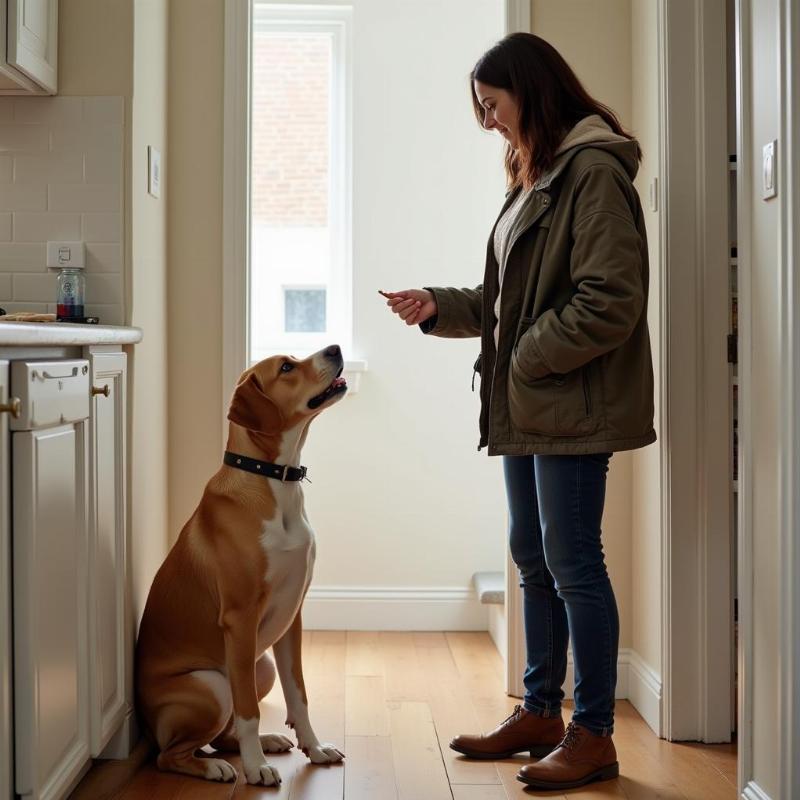Barking at strangers is a common canine behavior, often stemming from territorial instincts or fear. While some barking is natural, excessive barking can be disruptive and problematic. Fortunately, with patience and consistent training, you can teach your dog to greet strangers calmly and confidently. This guide provides proven techniques to help you achieve a peaceful and well-mannered companion.
Understanding the Reasons Behind Barking
Before diving into training, it’s essential to understand why your dog barks at strangers. Is it fear, territoriality, or excitement? Identifying the root cause helps tailor your training approach for maximum effectiveness. Fearful barking is often accompanied by tucked tails and widened eyes, while territorial barking involves a stiff posture and direct stares. Excitement-based barking is usually more frantic and accompanied by wagging tails and jumping.
Desensitization and Counter-Conditioning
Desensitization involves gradually exposing your dog to strangers at a distance where they don’t bark. Start far away and slowly decrease the distance as your dog remains calm. Reward their quiet behavior with treats and praise. Counter-conditioning pairs the presence of strangers with something positive, like delicious treats. Over time, your dog will associate strangers with good things, reducing their urge to bark.
The “Quiet” Command
Teaching the “quiet” command is crucial. When your dog starts barking, say “quiet” firmly. Once they stop, even for a brief moment, reward them. Consistency is key, and this command will eventually become a reliable tool to manage barking.
 Dog Training to Not Bark at Strangers 2
Dog Training to Not Bark at Strangers 2
Socialization from an Early Age
Early socialization is vital for preventing excessive barking. Expose your puppy to various people, places, and sounds during their crucial developmental period (up to 16 weeks). This helps them become well-adjusted adults who are less likely to perceive strangers as threats. Enrolling in puppy classes can provide structured socialization opportunities.
Positive Reinforcement Training
Positive reinforcement training focuses on rewarding desired behaviors. When your dog greets a stranger calmly, shower them with praise, treats, or favorite toys. This reinforces the calm behavior and encourages them to repeat it in the future. Avoid punishment, as it can worsen fear and anxiety.
Seeking Professional Help
If your dog’s barking persists despite your efforts, consult a certified dog trainer or veterinary behaviorist. They can assess your dog’s specific needs and develop a tailored training plan. They may also identify underlying anxiety issues contributing to the barking.
Conclusion
Training your dog not to bark at strangers requires patience, consistency, and positive reinforcement. By understanding the reasons behind the barking and implementing the techniques outlined in this guide, you can help your canine companion become more comfortable and confident around new people. Remember, a well-trained dog is a happy dog, and a quiet home is a happy home.
FAQ
- How long does it take to train a dog not to bark at strangers? It depends on the dog’s age, temperament, and the consistency of training. It can take weeks or even months.
- Is it okay to use bark collars? Bark collars can be aversive and are generally not recommended. Positive reinforcement methods are more effective and humane.
- What if my dog is aggressive towards strangers? Consult a professional dog trainer or veterinary behaviorist immediately. Aggression requires specialized intervention.
- Should I punish my dog for barking? No, punishment can exacerbate fear and anxiety. Focus on rewarding calm behavior.
- Can older dogs learn not to bark at strangers? Yes, older dogs can learn new behaviors. It might take more time and patience, but it’s definitely achievable.
- How can I socialize my dog during the pandemic? Arrange controlled, socially distanced meet-ups with friends and their dogs. Focus on positive experiences.
- My dog only barks at certain types of strangers. Why? Your dog might be reacting to specific visual cues, like hats or uniforms. Desensitization can help address this.
Related Articles
About Beautdogs.us
Beautdogs.us is your premier online destination for all things dog-related in the USA. We offer expert advice on dog breeds, care, training, and product recommendations. Whether you’re a seasoned dog owner or a new puppy parent, our comprehensive resources empower you to provide the best possible care for your furry friend. From breed-specific guides to training tips and product reviews, Beautdogs.us is your trusted source for a happy and healthy canine companion. Contact us at [email protected] or +1 501-555-7529.